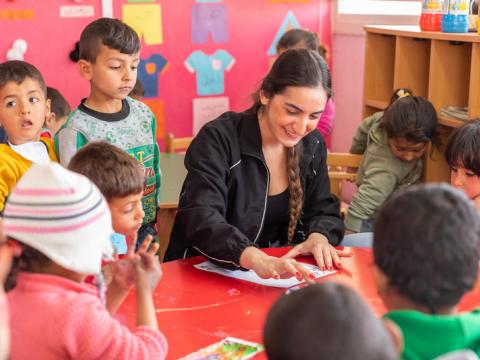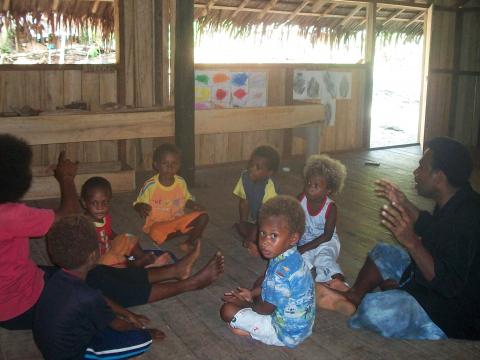
The Global Forum for Refugees must do more on education
By Kerin Ord, Global Sector Lead – Education, World Vision International
What early learning looks like
I was recently asked to babysit my friends’ two young children: a boy who is two-and-a-half years old and his sister who is eight months. I sat on the floor, talking to the baby girl as she held a stuffed toy. She tried to put it in her mouth, in her eye, up her nose – in my eye – and as she did I repeated those words: mouth, eye, nose.
While we played, her older brother sat close by, lining up toy cars. He told me which colour each car was. Then he counted them. “One, two, four, five!” he exclaimed. “Almost!” I said as we counted together, “One, two, THREE, four, five.”
This was a moment of calm with no crying, no temper tantrums, and no stressful babysitter trying to keep it all together. It gave me a chance to reflect on all of the learning that was taking place in front of me. (As someone working in education, I reflect on that kind of thing.)
The baby was practicing her motor skills. She fumbled with her toy, trying to make it do what she wanted, learning all the time about how to make her hands work in concert. The young boy was learning through play; reinforcing lessons his parents and teachers had taught him about colours and numbers. These are two children who are starting off well, I thought.
How do we know what ‘well’ is? In the context of early childhood development it means that the youngest children have nurturing caregivers who engage them through play, conversation, and by providing a safe, predictable environment for them to grow up in. They receive nutritious food to feed their growing brains and bodies. The older child has access to quality early childhood education programming. This doesn’t mean every day is perfect, but it does mean that these children are being set up to thrive now, and into the future.
Refugee children’s early childhood experiences will create their adult realities
Girls and boys growing up as refugees are not as fortunate as my friends’ young ones. Children represent more than 52 per cent of all refugees. At least 3.7 million refugee girls and boys are out of school. These trends profoundly affect their growth, development and ability to learn.
The first five years of life play a vital role in the formation of intelligence, personality and social behaviour, as well as the capacity to lead a productive adult life. Early adverse experiences can have a detrimental impact on physical and psychological health for years to come. Early childhood development and education programmes can prevent the trauma that young refugee children often endure. These programmes can also help those who’ve suffered recover and become more resilient.
The problem is that education for refugee boys and girls is still grossly underfunded and underprioritised. Investments in early childhood development and education programmes are low cost and high reward, but education in emergencies only received 3.8 per cent of sector-specific global humanitarian funding in 2017. Refugee children – including the youngest among them – are being left behind. Without investment in integrated early childhood development and education programmes, we will not realise the Sustainable Development Goals. Not only that, but we’ll have wasted the potential of millions of children who have to struggle to maintain their health and well-being as adults.

Children learn letters and numbers in an early childhood education programme in Bekaa Valley, Lebanon. World Vision, in partnership with UNICEF, provide early childhood education for children aged three to five, and aim to prepare students to enrol in the formal education system once they reach the age of six.(Photo credit: Georges Mghames / World Vision)
How World Vision will help the youngest refugee children get a good start
The first ever Global Refugee Forum takes place 16 – 18 December 2019. It follows the adoption of the Global Compact on Refugees which outlines specific considerations and supports that must be met for all children affected by displacement. These considerations include an imperative for host countries, member states and relevant stakeholders to come together to ensure that children’s rights to education – including support for learning and development during their earliest years – are met.
World Vision is stepping up to ensure refugee girls and boys – including those with disabilities – get off to a good start. At the Global Refugee Forum, we’re promising the world’s youngest refugee children, and their caregivers, that we will work harder to meet their unique learning and development needs.
By 2030, World Vision will ensure that refugee children and caregivers in at least 12 countries can access quality, family-centred, sustainable, and integrated early childhood development and education programmes. These programmes will align with global and national frameworks and standards, like the Nurturing Care Framework and the INEE Minimum Standards for Education. Our experience working with Syrian refugees in Jordan and Lebanon shows us that these investments produce results. In Jordan, 96 per cent of children attending World Vision supported Early Childhood Care and Development Centres demonstrated improved learning outcomes.
In addition, we will continue to work with caregivers to provide quality mental health and psycho-social support. Caregivers are crucial for providing nurturing care and protection to infants and young children. Adults must be taken care of in order to take care of their children well. For example, we know that postnatal depression has a negative effect on the quality of mother-child interaction. Twelve months after participating in World Vision’s early childhood development and education programming, mothers in Jerusalem – West Bank – Gaza had significantly less depressive symptoms than those who did not participate.
The world must keep its promises to children
Now it’s the world’s turn. There is an urgent need for the international community to make and adhere to political, financial and legal commitments that ensure all children – including the youngest refugees – have their right to education realised.
Education is not only a right, it is a life-saving intervention. Children and their families consistently say their main concerns during disasters are education and protection. Education must be part of the first response to any crisis or conflict.
The continual underfunding of education and child protection must be addressed at the Global Refugee Forum. Children will remember the promises we make to them, and we should all want to live in a world where those promises are met.


